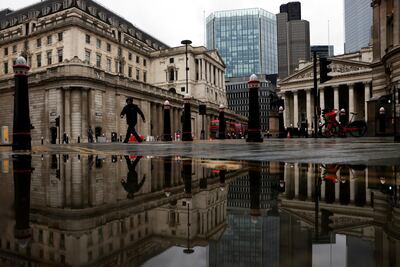Britain’s mortgage approvals dipped in February when buyers expected Finance Minister Rishi Sunak’s property tax break to expire, but levels remained the highest since March 2016, Bank of England data showed.
UK lenders approved 87,700 home loans in February, down by almost 10,000 on January and significantly lower than the peak of 103,700 in November. However, approval levels were still 30 per cent above the same month a year ago.
The BoE said mortgage lending strengthened in February as individuals borrowed an additional £6.2 billion ($8.53bn) secured on their homes, the strongest net borrowing since the £7.2bn recorded in March 2016 when the market was boosted by stamp duty changes. It was also up from £5.2bn on January.
“The strength in mortgage borrowing follows a large number of approvals for house purchase. In February, there were 87,700, which – while down from a peak of 103,700 in November 2020 – was well above the monthly average in the six months to February 2020 (67,300),” the BoE said.
Effective interest rates on new mortgage borrowing rose to 1.91 per cent in February, slightly higher than January’s 1.85 per cent.
Britain's property market soared last year after Mr Sunak unveiled the Stamp Duty Land Tax holiday in July to bolster the sector as Britain grappled with the effects of the Covid-19 crisis.
Under the tax break, the first £500,000 of the purchase price of a main residence in England and Northern Ireland was exempt from SDLT, with the move causing a surge in transactions that sent house prices soaring to an average record high of £252,000 in 2020 – up 8.5 per cent from 2019.
Mr Sunak extended the tax break in his March budget to maintain high market in the months ahead as the country slowly eases its Covid-19 restriction measures.
The SDLT holiday is set to continue until the end of September, though from June onwards the threshold for the nil rate band will decrease.
This means government support for the housing market is set to remain in place for much of the year, said Sam Miley, an economist at the Centre for Economics and Business Research.
“This is likely to result in a further period of heightened transactions and, ultimately, continued upward pressure on house prices," he said.

Separately, the BoE’s credit data showed consumers repaid £1.2bn of personal debt in February, with most of that going towards credit card payments, at a time when much of the country was under some sort of lockdown.
It meant consumer borrowing dropped 9.9 per cent year-on-year in February, the biggest drop since the series began in 1998, the BoE said.
“This marks the seventh consecutive month in which consumers’ repayment of existing debts outweighed the value of new borrowing,” Mr Miley said.
“Given the lack of spending opportunities, consumers continued the trend of paying off existing debts with finances they would have spent elsewhere in more normal circumstances.”
The pace of repayments slowed from January, however, when consumers repaid £2.4bn. The BoE data also reported a rise in the amount of cash households are holding in banks and building societies to £17.1bn.
“Overall, the slowdown in debt repayment by households and businesses suggests that the drag on the economy from the third Covid-19 lockdown may be starting to ease,” Thomas Pugh, UK economist at Capital Economics said.
Meanwhile, non-financial businesses repaid £0.2bn borrowed from banks, after repaying £0.8bn in January.
The fact there was not another surge in borrowing, indicated that firms “are no longer desperate for cash”, Mr Pugh said.
“That said, while large businesses reduced their bank loans by £0.3bn, compared to a repayment of £1.4bn in January, small and medium-sized businesses borrowed an additional £0.4bn from banks in February, about the same as in January.”
Looking ahead, Mr Miley said the economy was set to witness a considerable uplift in activity, in line with the government’s roadmap as non-essential retail and hospitality venues start to open.
“This is set to entail a boost to consumer activity, with Cebr forecasts pointing to quarterly consumption growth of 3.5 per cent in both Q2 and Q3," he said.


